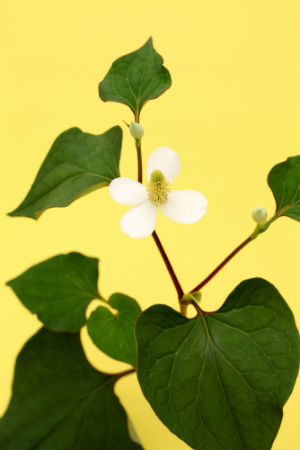4 Benefits of Dokudami |  |
| Posted: 31 Aug 2014 08:00 AM PDT  Dokudami is an herbaceous perennial plant native to Japan, China, and Korea and is a key component in detox foot pads. It has a long-standing culinary use in traditional Asian cooking and has been used for centuries in Ayurvedic practices. Research is slowly beginning to support its ancient use in natural health, with studies demonstrating benefits for the immune system and respiratory tract. Its ability to support detoxification makes it a perfect ingredient for detox foot pads, not to mention a large number of dietary tools that support toxin removal.
What Is Organic Dokudami?Known by its scientific name Houttuynia cordata, dokudami is a flowering plant that grows across numerous countries in Asia. Dokudami grows mostly in dark, moist areas, sometimes submerged deeply in freshwater areas. An invasive plant, dokudami can be found growing on hills, fields, and even between cracks in asphalt. It's known as "fishy-smell herb" in Asia because when you press its leaves it produces an odor similar to that of fish. Dokudami also means "poison-blocking plant" in some cultures, and was often used for the exact same purpose. The plant can grow between twenty and eighty centimeters high, and the leaves are typically heart shaped in appearance. It is treated as a leaf vegetable in many areas of Asia, often being used as a garnish for soups, meats, and cooked vegetables. The Health Benefits of Organic DokudamiExtensive and thorough research into dokudami has revealed some surprising findings, particularly in relation to human health. Ancient wisdom gives many researchers clues into its biological behavior, and new research studies are beginning to validate numerous physical benefits. These benefits include: 1. AllergiesIn a recent article, researchers examined dokudami's effects against allergies and asthma. [1] Both disorders are the result of the excessive release of histamine, a compound that initiates a local immune response to toxin exposure. When the body is allergic to a substance, the substance causes the body to produce an excess of histamine. Often known as anaphylactic reactions, repeated exposure to an allergic substance can be life threatening if not dealt with properly. Studies demonstrate that dokudami has excellent inhibitory effects on histamine release, possibly blocking the compound and reducing anaphylactic effects. 2. Combats Free RadicalsA free radical is any chemical compound with a free, unpaired electron. Compounds with a missing electron are often unstable and exert damage on other compounds, cells, and DNA. Free radicals aren't all bad, though, as we need these compounds–in minute concentrations–for appropriate biological functions. Unfortunately, our exposure to environmental toxins and chemicals in our food create an increased production of these harmful radical compounds. Research has linked free radicals to aging, cancer, and a host of other ills. Dokudami has been billed as an excellent free radical scavenger, [2] supporting the body's efforts in neutralizing circulating free radicals. The herb contains polyphenols, potent compounds that display a high amount of antioxidant activity. 3. Bacteria ProtectionBacteria is essential for life, and we simply cannot survive without a proper balance of bacteria in both our body and the environment. Good bacteria is important for digestion, among a range of other mechanisms. A recent article has shown that dokudami fights a variety of harmful bacteria in the digestive system, particularly Propionibacterium acnes and Staphylococcus epidermidis. [3] Both types are the primary cause of acne, prompting many professionals to recommend dokudami as a natural, helpful skin supporter. 4. Immune System SupportResearch has shown that dokudami may help stimulate the immune system by increasing the production of lymphocytes, white blood cells that are crucial for the body's natural defense system. [4] These white blood cells are sometimes referred to as natural killer cells, and a plethora of research has found that these cells are important for fighting numerous degenerative diseases. Dokudami, in this case, should be seen as merely a natural component to an overall healthy lifestyle. Exercise, a diet high in vegetation, and plenty of sunshine and sleep are also helpful ways for supporting immune system function. Why Organic Dokudami Is In Our Detox Foot PadsDetox Foot Pads have many valuable ingredients–including organic dokudami–that support the body's natural detoxification process. The importance of using high-quality herbal ingredients can't be understated, as these natural components are necessary for providing effective cleansing and detoxing results. As research continues to grow in response to consumer demand for health-supporting herbs, we should expect to see more benefits of dokudami and its relation to physical health. Until then, know that this herb has potential benefits for the immune system, the aging process, digestive function, and even skin health. -Dr. Edward F. Group III, DC, ND, DACBN, DCBCN, DABFM References:
The post 4 Benefits of Dokudami appeared first on Natural Health & Organic Living Blog. |
| You are subscribed to email updates from Natural Health & Organic Living Blog To stop receiving these emails, you may unsubscribe now. | Email delivery powered by Google |
| Google Inc., 20 West Kinzie, Chicago IL USA 60610 | |
No comments:
Post a Comment